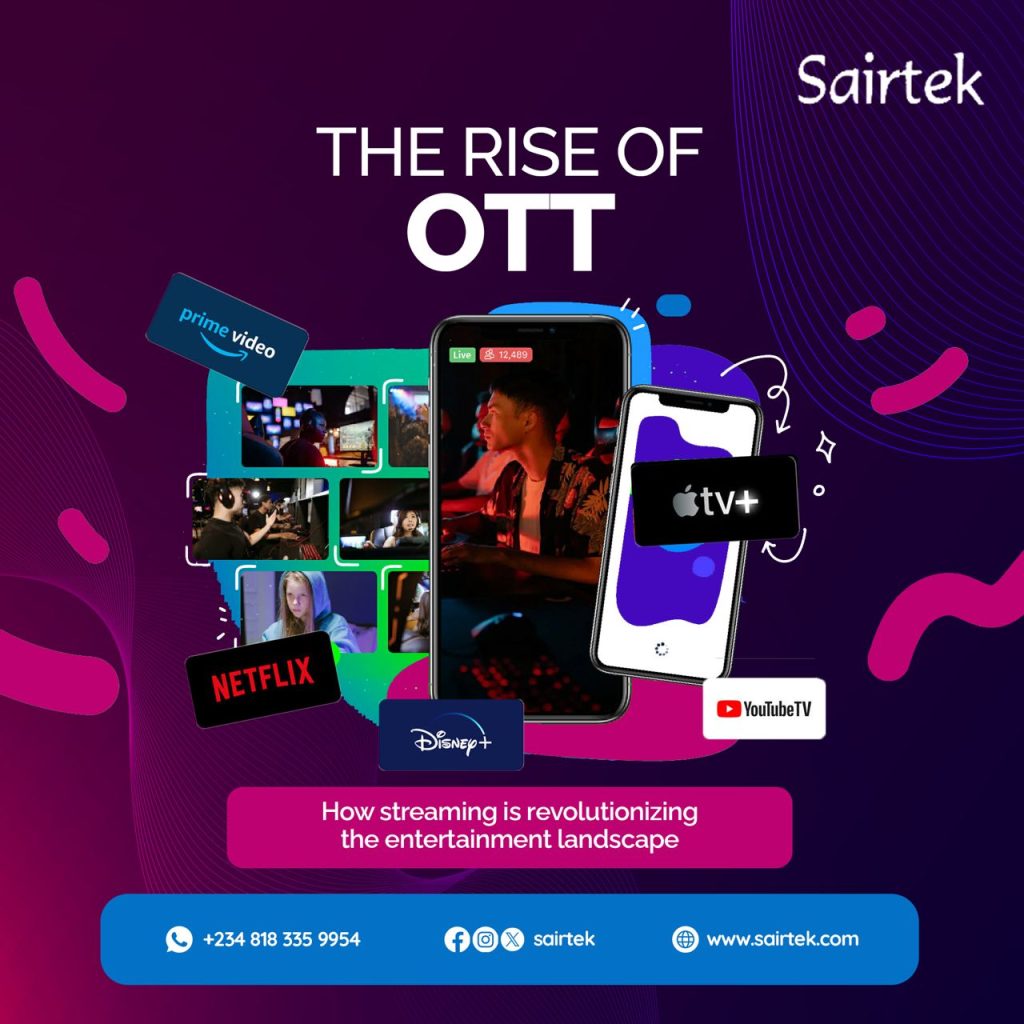How OTT Streaming Is Shaping the Entertainment Industry

Imagine the flexibility where you can watch your favorite movies, TV shows, and live sports games anytime, anywhere, without the need for a satellite or traditional cable subscription. This is where OTT streaming has come to play. With the rise of platforms such as Netflix, Amazon Prime Video, and Disney+, the way we consume entertainment has seen an upscale revolutionization.
This article aims to discuss the growing popularity of OTT streaming and its impact on the entertainment industry.
What Is OTT Streaming?
OTT stands for “Over the top” and is the practice of streaming content whether video, audio, and other media content directly across the internet. OTT platforms make use of the internet to deliver its content directly to viewers devices such as smartphones, smart TVs, tablets, or streaming devices like Roku and Apple TV.
OTT streaming services offer large range of content to its viewers which include movies, TV shows, religious programs, documentaries, and even live sport games. Viewers have access to these streaming platforms through dedicated apps or websites, making it easy to watch their favorite content on-the-go or from the comfort of their bedroom. It has drastically changed the way we consume entertainment and also a huge advantage over cable networks were viewers get to pay a subscription fee.
The Growth and Popularity of OTT streaming
The popularity of OTT streaming can be attributed to several factors. Firstly, the reliability and affordability of fibre internet connections have made it easier for viewers to stream content seamlessly online. This, combined with the expansion of smartphones and other connected devices globally, has created a perfect surge for the demand and popularity of OTT streaming.
Another determining factor is consumer preference as viewers are continuously looking for flexibility in their entertainment options. With the help of OTT streaming, they can choose what to watch, when they want to watch it, and how they want to watch it. This on-demand nature of OTT streaming has resonated with a large audience.
How Is OTT Delivered?
OTT is delivered directly across the internet and thus bypasses more traditional channels such as fibre and broadband, satellite and cable broadcasting platforms. As long as you have an active internet connection, you will be able to stream and watch your favorite media content as you wish.
Simply put, all you need to access on-demand streamed content is an active connection to the internet and a device to watch it on.
OTT Streaming Vs Traditional Broadcasting
OTT has gained so much popularity over the years, although that does not mean that traditional broadcasting networks such as cable are being relegated. Most OTT users usually complement their viewing choices alongside a cable subscription. In most cases, OTT and more traditional forms of broadcasting will coexist, giving more viewers access to richer content from around the globe.
What Type of Content Is Best Suited For OTT Streaming?
OTT is well known for popularized video-on-demand (VOD) services like Amazon Prime Video, Netflix, and Roku. However, App services commonly use OTT as well.
- Apps: App provides a comprehensive range of free to air (FTA) and OTT streaming services across the globe, with a well operated and managed 24-hours playout facility.
- Video: Video is naturally the most popular use of OTT, with large streaming platforms such as Netflix, Amazon prime, Hulu, and Roku etc.
Challenges and Opportunities of OTT Streaming
The popularity of OTT has brought about significant opportunities and has also posed challenges for both content creators and platform providers. One of the main challenges is the increasing atomization of the OTT market. With multiple platforms vying for viewers attention, content creators must navigate the complexities of licensing and distribution agreements to make sure their work reaches the largest audience possible.
With new OTT platforms entering the market regularly, viewers have more options than ever before. This means that platforms must continually update and offer original content and features to stand out from the competition.
Despite these challenges, OTT streaming presents significant opportunities for content creators and platform providers alike. The global reach of OTT allows content to reach a larger audience regardless of geographical boundaries.
Future Trends In the OTT Industry
As technology continues to evolve, the OTT industry will continue to see growth and innovation. Several trends are shaping the future of OTT streaming and entertainment as a whole. A key trend is the adoption of 4K and HDR (High Dynamic Range) contents. As seen in sophisticated devices like the Apple iPhones, viewers are able to achieve higher resolutions and better picture quality which gives a cinematic experience and in return, enhancing the value proposition of OTT streaming.
Artificial Intelligence (AI) and Machine Learning (ML) is expected to play a significant role in the future of OTT streaming as it will help improve content recommendation and enhance overall user experience.
If you would like to find out more about OTT streaming services that we offer and also get expert recommendations, get in touch with us today – we are ready to set you up.